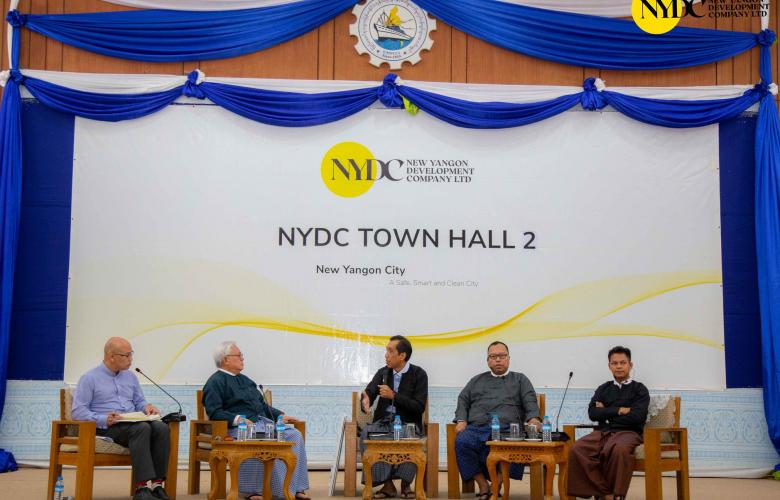The NYDC addresses key public concerns on New Yangon City
Contact
The NYDC addresses key public concerns on New Yangon City
Serge Pun, NYDC CEO addresses topics raised about the New Yangon City a recent townhall meeting.
The NYDC had the second Townhall Meeting on 6 March 2019. Some of you may have attended in person, some may have watched it on the NYDC Facebook Live Stream.
Serge Pun describes it as a robust discussion and he is glad it was because it allowed the NYDC to hear some of the fervent arguments against the project. The discussion even helped those in favour of the project to better understand the issues and concerns of those who may not be supportive of the project.
Key Issues Raised
According to the NYDC, many of the concerns raised were issues that the Yangon Regional Government and NYDC had deliberated since the inception of this project. For example, formulating an equitable plan for the appropriation of farm land and the resettlement of the indigenous farmers, protecting the interests of the State, avoiding any scenarios of falling into a ‘debt trap’ to foreign groups, ensuring that Myanmar’s business interests and workers benefit to the maximum extent, and of course the need for transparency and fairness in awarding contracts; especially the need to prevent corruption and self-serving interests to dictate the implementation of the project. These and many other issues were never ignored. In fact, they continue to be at the fore of our considerations in every step that we take to move this project forward.
The present divide in opinion perhaps stems from a different stance that critics of the project have taken. Serge Pun's observation of the main positions they have taken are:
- They oppose the development of a new city as they feel that resources should be invested into upgrading the present Yangon City;
- They feel that reaching to ‘outside help’, in particular, foreign investment, would result in giving away too much benefit to others;
- They feel that even if we are able to negotiate terms that are devoid of debt and secure favourable terms and conditions to our benefit, it is ‘too good to be true’ and hence are not credible;
- They feel that China is not a reliable partner in developing our country and that any involvement from China will be a detriment to our interests;
These are some of the main perspectives which the NYDC deduced from the debate at the Townhall Meeting and from feedback on social media.
"We at NYDC are entrusted with the duty to carry out the arduous task of building a new city. I consider it my duty to explain to the best of my ability, the mission and goals that have been laid down by the Yangon Regional Government, and the ways and means by which we intend to achieve those goals," says Pun.
Click here to watch the NYDC Facebook Live Stream of the Town Hall meeting held 6 March 2019.
The Need for A New City
Firstly, building a new city is essential to meet the needs of Yangon says the NYDC.
"It can mitigate existing Yangon’s many issues that we are currently facing. Apart from the immediate goal of creating massive employment (the only way to uplift the living standards of our people and provide them a better future), there is the long-term need to accommodate the growing population of the city (an inevitable situation given the trend of urbanisation) so that the people of Yangon will afford a better living environment," says Pun.
"Any incremental improvement of the existing Yangon city will not meet this goal due to legacy issues. The fact that we can build a new city so close to the existing city is a unique blessing not commonly available to many other cities in the world. The notion that the new city shall harm the existing city is totally erroneous and short-sighted. In reality, the new city will become a strong impetus to make the whole of Yangon even more vibrant and attractive in virtually all spheres of living and working."
Pun goes on to say "the mission of building a safe, clean and smart city is relevant and genuine. In time, these benefits will manifest in reality. There are so many living examples of this reality in the world today -- Pudong in Shanghai, Incheon in South Korea, Shenzhen in Guangdong Province, Masdar City in Abu Dhabi, etc."
Secondly, Pun points out that there is no doubt that when you invite Foreign Direct Investment (FDI) you will be giving away something.
"FDI is not a charitable exercise. Investors invariably expect to receive a return for the investment risks they take to make the investment. But it is definitely untrue that they take away everything or take away too much."
"The discretion to give is with the giver, not the taker. Therefore we should be at an advantage if we are diligent in our efforts to uphold the interest of the nation. The comment that it's 'Too good to be true!’ is really relative. To some people it might be too good to be true, to others it might be perfectly normal and it’s just what it should be, and yet to others, it might be totally incredible. I suppose it reflects different expectations of what the outcome of a bilateral negotiation is and also concerns the effectiveness of such negotiations."
Ride the Momentum
Mr Pun addresses the issue of whether China is a good partner or a reliable partner as somewhat more contentious.
"History is replete with instances of the powerful nations taking advantage of the weak; colonialism and imperialism are simply manifestations of that.
The antidote for that is not sitting out by the wayside or closing ourselves out, but to do precisely the opposite. This means we should be fully engaged with knowledge, vision and self-confidence to avoid being taken advantage of. We should make the most of the economic and technical prowess of our powerful neighbour for our mutual benefit and this is the time to figure out on how to grow with them. Whether anybody likes it or not, the operative word has to be "mutual"."
The key for Myanmar is to improve its infrastructure through investment, for without infrastructure any fight for a share would be difficult.
"This is a golden opportunity and we must move fast as investors will not wait for us. These manufacturing investments are from many countries including China," says Pun.
As Colliers views it, there are misconceptions about China’s regional economic aspirations. "Many interpret the BRI as a policy that solely benefits China at everybody else’s expense, which is not essentially the case. The role of the government to use the BRI to the country’s advantage and create a strategy that allows us to leverage the benefits without contradicting our policies or sacrificing our economic sovereignty will play a crucial role. Overall, a project that could see billions of dollars invested in infrastructure creates huge opportunities for those involved in Myanmar’s construction sector. However, the relatively limited supply of building materials in the country means that most of it will likely be imported from abroad. Despite the inevitable challenges, if stakeholders can successfully move ahead with the development of the new city, it will create huge economic benefits for many local industries and potentially hundreds of thousands of job opportunities for Yangon residents," says Colliers.
Focusing on the Mandate
Mr Pun explaines that he is not in any way interested to indulge in debates containing political flavours, but he wishes to state clearly that the mandate so far entrusted to NYDC by the Yangon Regional Government is to make New Yangon City a reality for the people of Yangon and Myanmar.
"We have committed ourselves to this mission with a single mindedness and a determination to succeed."
"It would be remiss not to mention in conclusion that the penultimate speaker from the audience at the Townhall exemplifies all the motivation and inspiration we hold. The speaker, local resident from the area of the new town spoke emotionally of his desire to see this new city emerge, a dream he has been living on for too long. As I hear him speak in the most simple language, with honesty and zest, I feel encouraged that we are on the right track and our efforts will ultimately be judged by the people who need it most. We are also encouraged and thankful to a large majority of people who have expressed their support during the Townhall and online," says Pun.
Source, Serge Pun, NYDC
Similar to this:
New Yangon City Phase 1 Infrastructure Projects: Status of EOI Submission
New Yangon Development Company invites expressions of interest for city challenge in Myanmar







